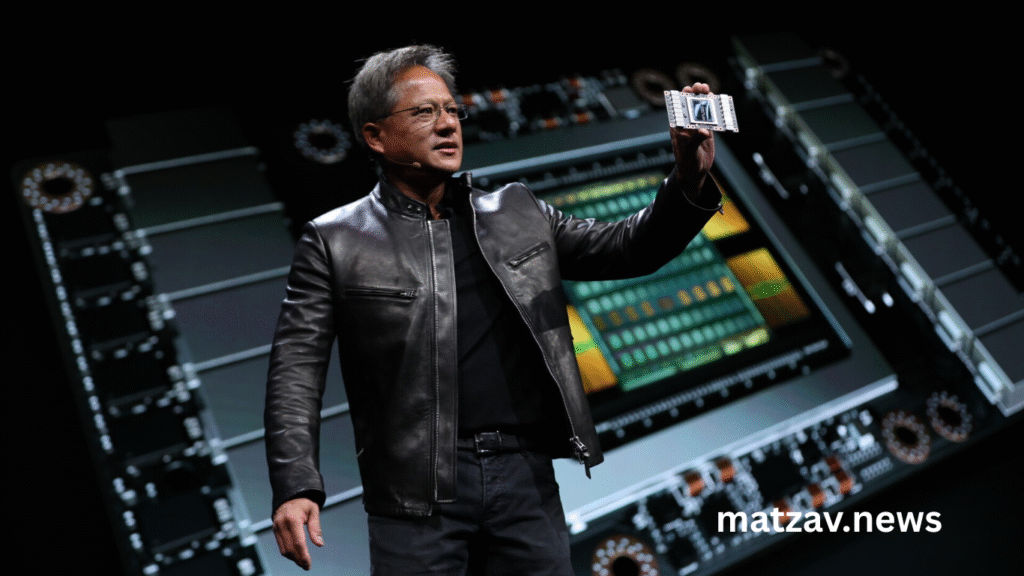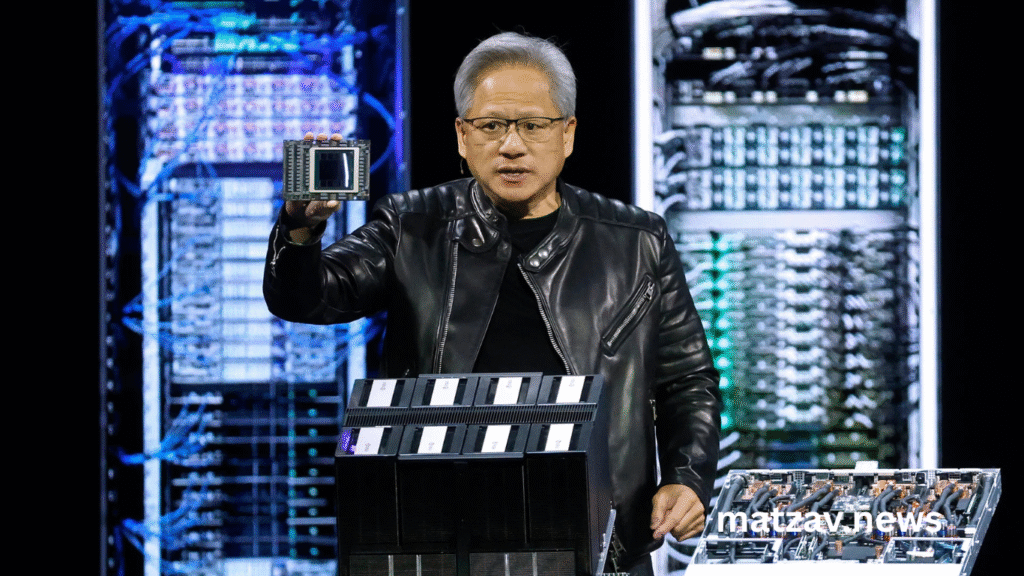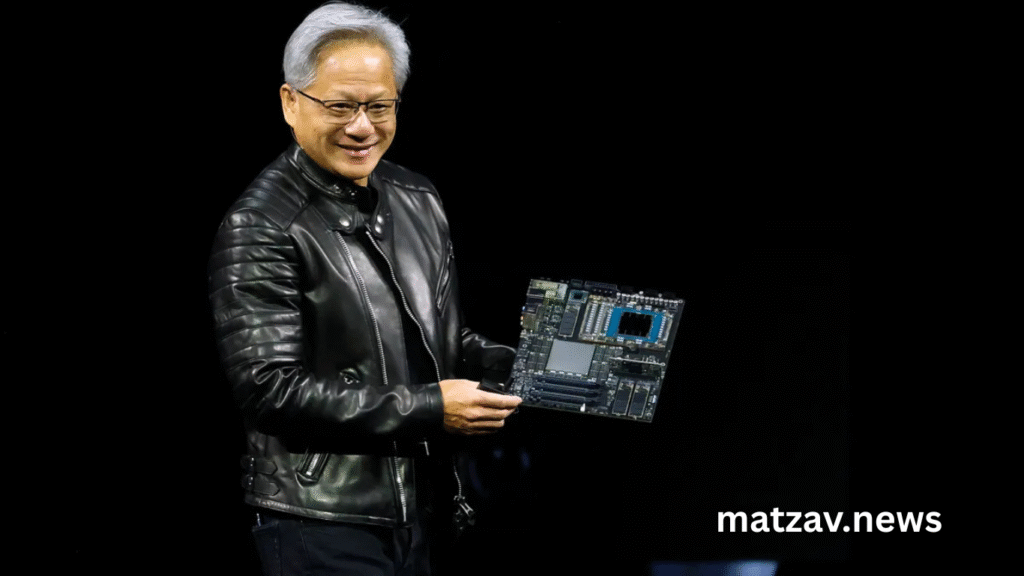In a major industry announcement that has implications far beyond the semiconductor space, Nvidia CEO Jensen Huang recently introduced a suite of cutting-edge technologies designed to solidify Nvidia’s dominance in the AI chip market. These strategic advancements come as global competition intensifies and demand for AI computing power skyrockets.
During the highly anticipated event, which drew attention from the tech world and even sporting communities such as the US PGA, Huang emphasized the importance of innovation, scalability, and ecosystem partnerships to fend off rising competition from tech giants like AMD, Intel, and emerging Asian players. Nvidia’s new releases showcase not only its commitment to AI acceleration but also its ambition to define the future of intelligent computing.
Nvidia’s Vision to Maintain Its AI Chip Leadership
The Rise of AI-First Infrastructure
Jensen Huang outlined how Nvidia plans to stay ahead of the curve by focusing on AI first data center infrastructure. Traditional chip designs are being overtaken by the need for highly parallel processing and real-time decision making. Nvidia’s new chips, tailored for generative AI, machine learning, and high performance computing (HPC), are optimized for scalability and speed.
The new architecture integrates software and hardware more seamlessly, a strategy that Huang called essential for future-ready computing. Nvidia’s goal is to ensure AI model developers, from Silicon Valley to the golf analytics teams at the US PGA, have access to the most powerful tools available.
Market Pressure and the Competitive Landscape
With competitors releasing advanced AI chips, Nvidia’s dominance is being challenged on several fronts. AMD’s MI300 and Google’s custom TPUs have begun making inroads in AI development labs. Huang responded by stating that innovation not just raw power is the answer.
Nvidia’s latest technologies aren’t just about performance; they prioritize energy efficiency, ease of integration, and modularity. These features are vital in industries that demand precision and high performance, such as autonomous driving, weather simulation, and even real-time sports analytics used in US PGA tournaments.
Groundbreaking Announcements from Jensen Huang

Blackwell GPU Architecture A Quantum Leap
The highlight of Nvidia’s announcement was the unveiling of the Blackwell GPU architecture, named after mathematician David Blackwell. This next-generation architecture promises a massive leap in performance with a new interconnect fabric, second-generation Transformer Engine support, and improved memory bandwidth.
Blackwell is designed specifically for generative AI models like GPT-style language models and diffusion-based image generators. With twice the performance per watt of the previous Hopper architecture, it provides unmatched efficiency an attractive feature for companies seeking sustainable AI solutions.
NVLink Switch Redefining Data Center Fabric
Another significant reveal was the new NVLink Switch system. It offers a revolutionary approach to inter GPU communication, allowing up to 256 GPUs to operate as a single massive unit. This will empower companies to train AI models at an unprecedented scale, eliminating bottlenecks and reducing training time by up to 40%.
This system will especially benefit real-time data analytics platforms used across industries, such as sports forecasting. These platforms include the kind leveraged during US PGA events for player tracking and predictive modeling.
Strengthening the AI Ecosystem with Strategic Alliances
Expanding Nvidia’s CUDA Platform
CUDA remains the cornerstone of Nvidia’s AI development stack. New enhancements have been introduced to support broader language support, improved debugging tools, and better integration with popular frameworks like PyTorch and TensorFlow. This makes it easier for developers to deploy AI solutions across industries.
CUDA’s continued expansion ensures Nvidia stays at the heart of AI development, attracting more talent and projects, including AI-based performance analysis tools used in athletic domains such as the US PGA.
Collaborations with Cloud Providers
Nvidia announced deeper integration with leading cloud providers like Amazon AWS, Google Cloud, and Microsoft Azure. These collaborations will enable companies to access the new Blackwell architecture through cloud-native services without heavy upfront investment in physical hardware.
Such partnerships are vital in democratizing access to cutting-edge AI, allowing smaller organizations, startups, and even sports organizations like the US PGA to harness AI capabilities without traditional barriers.
Focus on AI Safety and Regulation

Hardware-Based Security Enhancements
A key concern in AI deployment is model safety and data security. Nvidia has integrated hardware-level security features into its new chips, including advanced threat detection, encrypted data paths, and improved isolation capabilities.
These upgrades are critical in sectors that process sensitive data, such as healthcare, finance, and sports biometrics. For instance, US PGA fitness and training teams could deploy these chips to safeguard sensitive athlete data.
Aligning with Global AI Governance Standards
Nvidia is actively working with governments and global regulators to ensure its chips meet upcoming AI governance standards. Huang emphasized that transparency, explainability, and fairness are essential principles being embedded at the hardware level.
By doing so, Nvidia not only protects its technological lead but also ensures long-term compliance and ethical deployment of AI across sectors, including in public sports domains like the US PGA.
Empowering the Next Generation of AI Talent
Investments in AI Education
Nvidia is investing heavily in AI education, partnering with universities, and launching online learning platforms. The company is offering training programs that teach developers how to harness GPU acceleration, CUDA programming, and AI model optimization.
These initiatives are expected to produce the next wave of AI innovators some of whom may go on to work in AI-driven sports tech applications, revolutionizing experiences in leagues like the US PGA Tour.
Developer Ecosystem Growth
To support its vision, Nvidia has expanded its developer community programs, offering grants, hardware access, and dedicated support for researchers and students. This move ensures a steady pipeline of skilled professionals aligned with Nvidia’s AI ecosystem.
Whether it’s enhancing fan engagement with AI-powered apps or improving athlete training regimens with biomechanical analysis, Nvidia is setting the stage for wide adoption even in the data-heavy world of US PGA sports management.
Real-World Applications Across Key Industries

AI in Healthcare and Life Sciences
Nvidia’s GPUs are already transforming healthcare by powering diagnostics, personalized medicine, and robotic surgeries. The new technologies enhance these capabilities by offering better image recognition, real-time computation, and higher data security.
For example, researchers using AI to analyze large-scale health datasets can now do so faster and with more accuracy benefits that extend into athlete health monitoring for elite events like the US PGA.
AI in Sports and Entertainment
One of the most exciting frontiers for Nvidia’s technology is in sports. AI is being used to analyze player performance, forecast game outcomes, and personalize fan experiences. During the announcement, Huang highlighted how AI can revolutionize the way fans interact with sports data.
In the context of the US PGA, AI tools could provide real-time swing analysis, predictive scoring models, and custom fan experiences all powered by Nvidia’s hardware.
Frequently Asked Questions
What new technologies did Nvidia unveil to protect its AI chip leadership?
Nvidia introduced the Blackwell GPU architecture, NVLink Switch system, and enhancements to CUDA, focusing on performance, scalability, and energy efficiency.
Why is the Blackwell architecture significant?
It offers a massive leap in processing power and efficiency for generative AI models, making it ideal for training large language models and diffusion networks.
How does Nvidia plan to compete with companies like AMD and Google?
Through innovation in architecture, cloud integration, and ecosystem development, Nvidia aims to stay ahead by offering end-to-end AI infrastructure.
What is NVLink Switch, and why is it important?
It enables large-scale GPU clustering, reducing training times for massive AI models and supporting real-time applications like sports analytics.
How is Nvidia contributing to AI safety and regulation?
By embedding hardware-level security and aligning with global governance standards, Nvidia ensures ethical and secure AI deployments.
What role does CUDA play in Nvidia’s strategy?
CUDA is central to AI development on Nvidia hardware, and its recent upgrades improve integration with major AI frameworks.
How can cloud partnerships impact Nvidia’s AI adoption?
They enable scalable, cost-effective access to Nvidia’s latest hardware, allowing broader AI experimentation across industries.
Is Nvidia’s technology used in sports like the US PGA?
Yes, Nvidia-powered AI tools are being used in performance analysis, fan engagement, and predictive modeling in professional sports, including the US PGA.
Conclusion
Nvidia’s latest announcements position the company not only as a hardware leader but as a holistic force driving the AI revolution. With strategic innovation, strong partnerships, and a keen focus on ecosystem growth, Nvidia is reinforcing its role as a critical player in the future of computing—impacting sectors as diverse as healthcare, education, and even US PGA sports.
